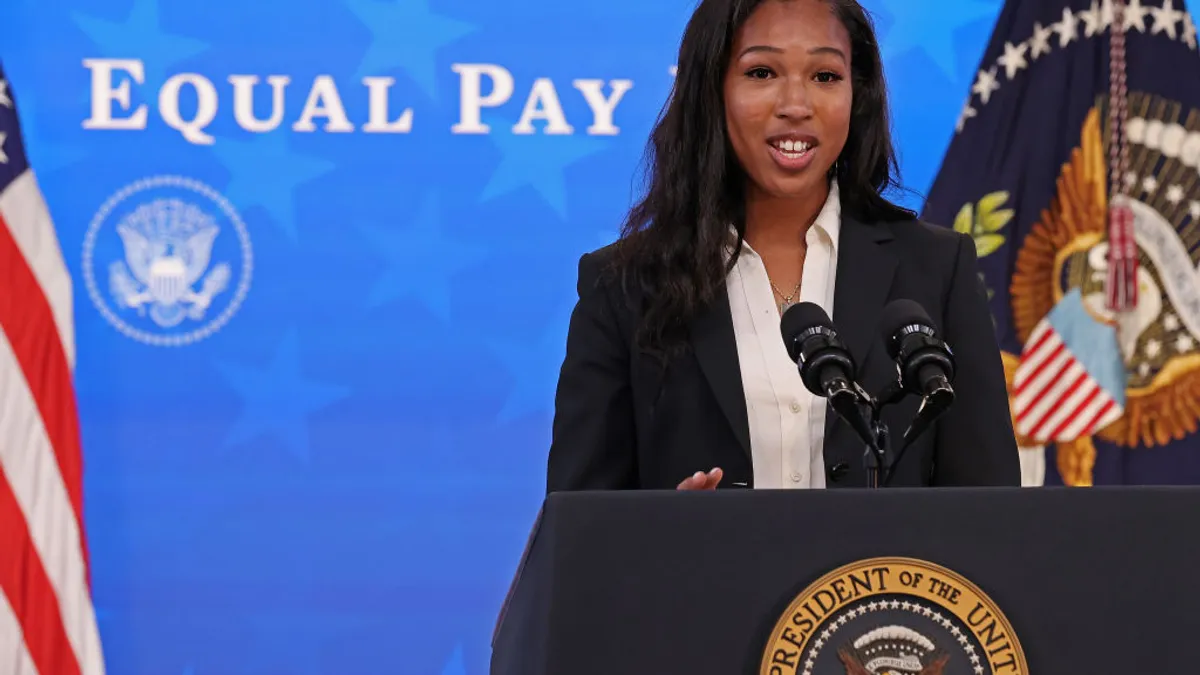In July 2019, the U.S. women's national soccer team successfully defended its 2015 FIFA World Cup championship title. By all accounts, the athletes' victory cemented their status as top performers in their chosen field.
Months earlier, however, members of the team argued in court that their pay did not reflect that status.
A March 2019 collective and class action brought by players on the women's national team, also known as the USWNT, alleged that the U.S. Soccer Federation, the nation's governing body for the sport, failed to promote gender equality by paying USWNT players less than it paid members of the U.S. men's national team.
"The USSF admits to such purposeful gender discrimination even during times when the WNT earned more profit, played more games, won more games, earned more championships, and/or garnered higher television audiences," per the filing.
The case made waves before, during and after the team's 2019 championship run, making its way up to the U.S. Court of Appeals for the 9th Circuit after a California district court ruled in favor of the federation. Last year, the U.S. Equal Employment Opportunity Commission filed an amicus curiae brief in support of the athletes.
Nearly three years later, the end of the legal saga may be in sight. USWNT players reached a $24 million settlement agreement with their employer in February, according to Mayer Brown, a law firm representing members of the team. In a joint statement, U.S. Soccer and USWNT said the settlement was contingent upon the negotiation of a new collective bargaining agreement.
"It's a really amazing day. I think we're going to look back on this day and say this is the moment that, you know, U.S. Soccer changed for the better." — @mPinoe on the #USWNT reaching a historic agreement in gender discrimination case. https://t.co/kWY5S6eOU4 pic.twitter.com/k6Wf2rx9qM
— Good Morning America (@GMA) February 22, 2022
Prominent figures in sports, media and politics were quick to comment on the announcement's implications for equal pay in and beyond the sporting world. Sources who spoke to HR Dive generally believe the news may help industry executives amplify their pay equity messaging to organizational leaders.
"For HR, what I think it does is it gives them the kind of background to elevate the pay gap conversation to the CEO," said Ian Cook, vice president of people analytics at Vancouver-based analytics firm Visier.
In the past, employers may have downplayed the importance of addressing pay inequities, Cook said, or outright avoided the topic altogether to avoid potential reputational risks and legal liabilities. But that calculus has changed in the years preceding USWNT's settlement announcement.
In 2020, for example, the Securities and Exchange Commission voted to amend certain disclosure requirements for public companies to include a description of employers' "human capital resources," among other factors. Moreover, investment firms such as Blackrock now include diversity, equity and inclusion efforts — with sometimes explicit references to compensation gaps — in their assessment of potential investment targets.
Even with those background developments, though, Cook said the USWNT settlement provides an external, publicly visible situation for HR to justify tackling pay discrimination and pay equity more generally. But HR leaders will still need to ensure that they have conversations with internal compliance and legal teams to ensure liability concerns are addressed.
"I don't think it holds the way it used to," Cook said of past corporate views about addressing pay gaps. That's due in part to broader discussions about pay transparency both inside organizations and as part of the broader legal system. "All of that points to a working population that wants to know."
That the proposed settlement offers back pay as well as a promise on behalf of U.S. Soccer to provide equal pay for all future tournaments may demonstrate to HR teams the importance of recognizing and correcting past compensation shortcomings, Paul Lewis, chief customer officer at global job search firm Adzuna, said in an email. He added that offering bonuses or other payment plans can make up for some differences, while broader pay analysis can evaluate parity across the board.
Still, the U.S. has much ground to cover in terms of closing its gender pay gap, Lewis said. He cited a May 2021 report by Pew Research Center showing that gap had "remained relatively stable" over the previous 15 years, with women earning 84% of what men earned in 2020.
"While in practicality this will take time to fully rectify, the move by the USWNT sets what we hope will be a strong precedent. It takes the conversation to a new stage," Lewis said. "Due to the widespread coverage of the case and influence this move has, we are optimistic that companies will follow suit."
And though other legal cases might lead to similar settlements or policy changes in the future, others question why pay equity must be litigated in order to be pursued in the first place.
"While this settlement is of course welcomed news, it's also disheartening we're even having these conversations still," Stephanie Lovell, head of marketing at hiring software firm Hirect, said in an email. "I'm not sure who needs to be reminded of this, but discrimination of any kind, whether it be based on gender, faith, sexual orientation, or anything else, has no place in today's society, let alone the workplace. Women should not have to wage years of expensive legal fights simply to have equal footing like their male counterparts."





















